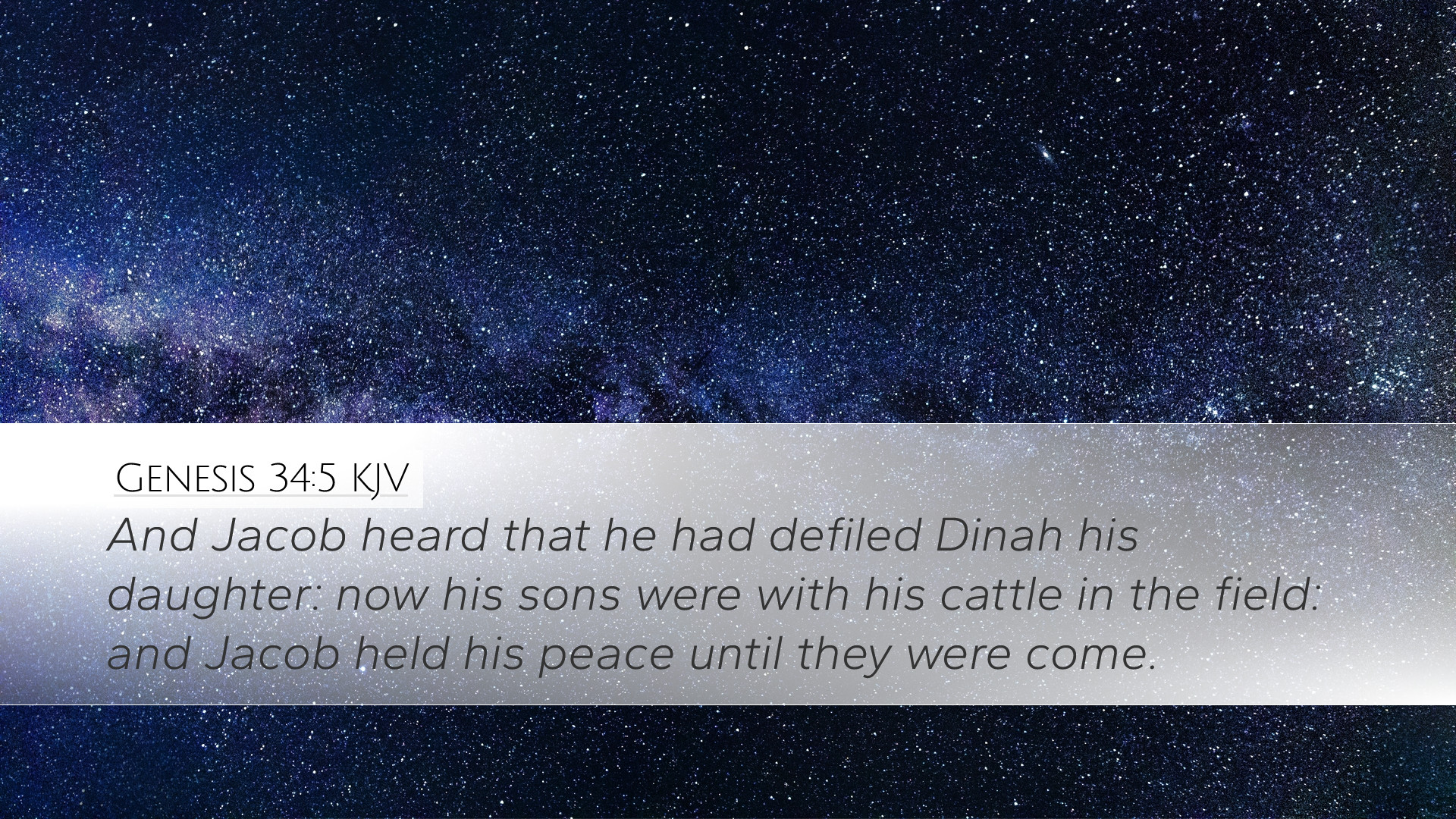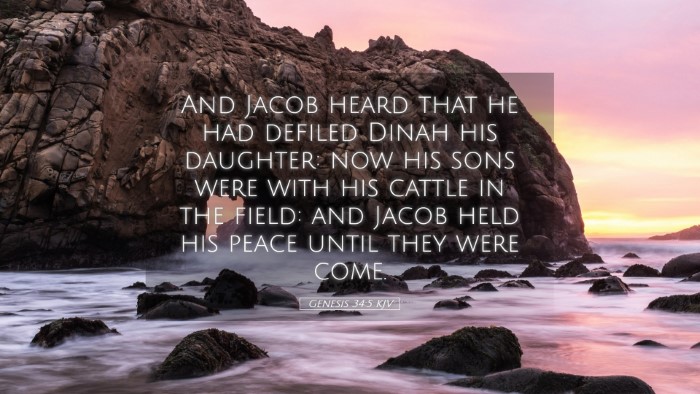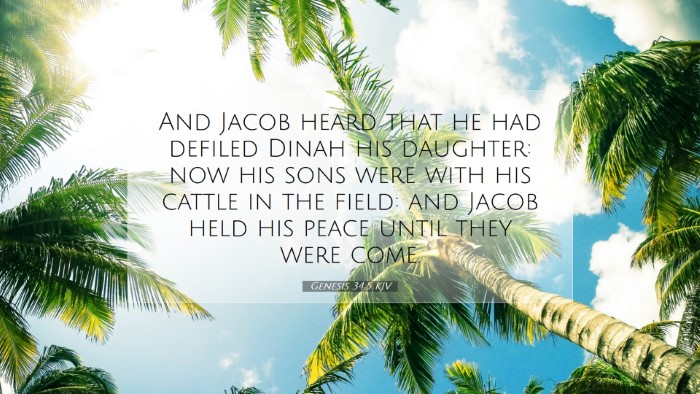Commentary on Genesis 34:5
Genesis 34:5 states: "And Jacob heard that he had defiled Dinah his daughter: now his sons were with his cattle in the field: and Jacob held his peace until they were come."
Overview
This verse occurs in a narrative detailing a grave incident involving Dinah, the daughter of Jacob, and Shechem, the son of Hamor the Hivite. It reveals Jacob's initial reaction to the news of his daughter’s defilement and sets the stage for the subsequent actions of his sons. The silence of Jacob, as noted in this passage, can be interpreted in various ways, prompting rich theological reflections and pastoral applications.
Insights from Notable Commentators
Matthew Henry
Matthew Henry observes that Jacob’s restraining silence signifies a moment of profound reflection. His daughters were few, and such an incident could have distraught a father’s heart deeply. Henry emphasizes that Jacob’s peace amidst the turmoil indicates a need for wisdom before responding to crises.
- Wisdom in Response: Jacob's silence suggests a measure of wisdom, as he awaited the return of his sons to gather information and perspective before acting (Henry).
- Family Dynamics: The implications of Dinah’s situation are profound; it speaks to the vulnerabilities that young women face and the responsibility families have in protecting them. Henry notes how this incident would impact not only the family dynamics but the broader community as well.
Albert Barnes
Albert Barnes adds context regarding the cultural implications of Dinah’s defilement. In ancient Near Eastern societies, such an act would bring shame, not just on the individual but also on the family, resulting in severe repercussions. He suggests that Jacob’s response, characterized by a tactical delay, may indicate a deeper understanding of the repercussions at hand.
- Understanding Cultural Context: This incident ought to be viewed within its cultural framework, where honor and shame were paramount. Jacob’s delay in reaction suggests he was weighing the broader implications, showing a level of prudence in a volatile situation (Barnes).
- Delayed Justice: The calmness that Jacob exhibited before responding is noteworthy, as it contrasts sharply with the eventual fervor exhibited by his sons. This can prompt discussions on the balance between anger and action.
Adam Clarke
Adam Clarke emphasizes the moral undertones in Genesis 34:5. He posits that Jacob’s inaction may reflect a sense of helplessness in the face of societal norms that allowed for such behaviors. Clarke suggests that this silence also foreshadows the tumultuous events that will follow, as Jacob's inaction will contrast with his sons' outraged response.
- Foreshadowing Consequences: Clarke notes the tension between Jacob’s peace and the impending response of his sons, representing the spectrum of human emotions in conflict. This has lasting consequences for Jacob's family and their future interactions with surrounding nations.
- The Role of Fatherhood: This incident raises questions about paternal duties in times of crisis. Clarke indicates that leadership often requires decisive action, and Jacob’s response can serve as a cautionary tale for modern leaders in positions of responsibility.
Theological Reflections
The reverberations of this verse in terms of theology and pastoral ministry are profound. Jacob’s initial stoicism in the face of personal crisis encourages exploration of a key biblical theme: the nature of proper concern and action in moments of distress. The unfolding drama invites us to consider the following:
- Silence in Times of Crisis: Jacob's reticence prompts leaders to reflect on the merits of pausing to seek guidance from God before acting rashly. It is a reminder that God sovereignly orchestrates events in a manner that may not immediately align with human expectations.
- Parental Responsibility: The narrative unfurls the weight of parental responsibility and the complexities of guiding a family in a fallen world. Leaders must grapple with the realities of protecting loved ones while addressing wrongdoings in a faithful manner.
- Consequences of Actions: The verse touches on the repercussions of sin—both individually and collectively. The events that follow Dinah's defilement serve as painful reminders of how actions can reverberate across families and communities.
Pastoral Applications
For pastors and theologians, Genesis 34:5 serves as fertile ground for application in contemporary church settings. The lessons to be drawn from Jacob's reaction are relevant to congregations facing their own crises:
- Encouraging Discernment: Leaders in a church or community context should encourage discernment over impulsivity. Wise leadership often requires waiting on the Lord for clarity.
- Addressing Injustice: It is essential for church leaders to actively address injustices within their communities, ensuring that silence does not signal complicity or inaction.
- Cultivating Open Dialogue: This verse encourages fostering an environment of open dialogue within families and congregations to navigate crises collaboratively, seeking God's wisdom.
Conclusion
In summary, Genesis 34:5 presents a rich tapestry of themes revolving around familial responsibility, moral integrity, and the complex dance between silence and action. The reflections provided by the noted commentators enrich our understanding of this critical moment in biblical history, allowing for deeper engagement with both the text and its implications for contemporary faith communities.


